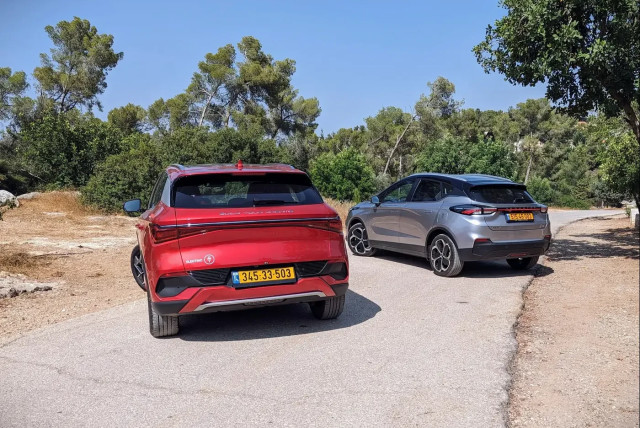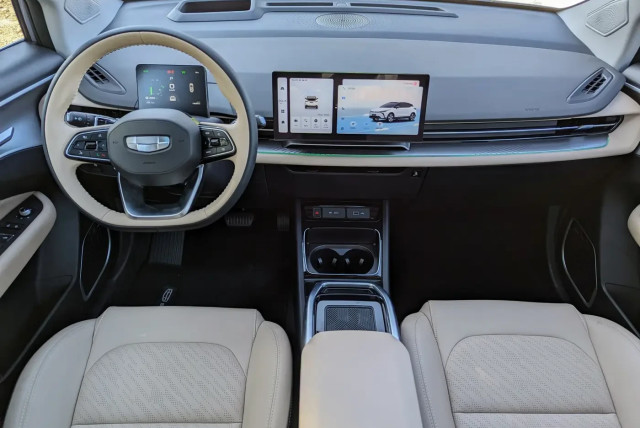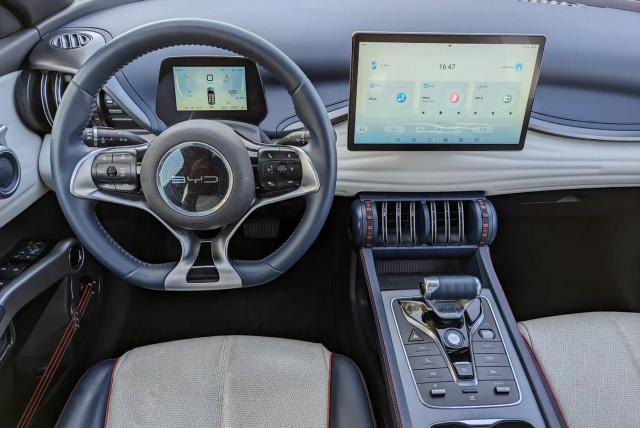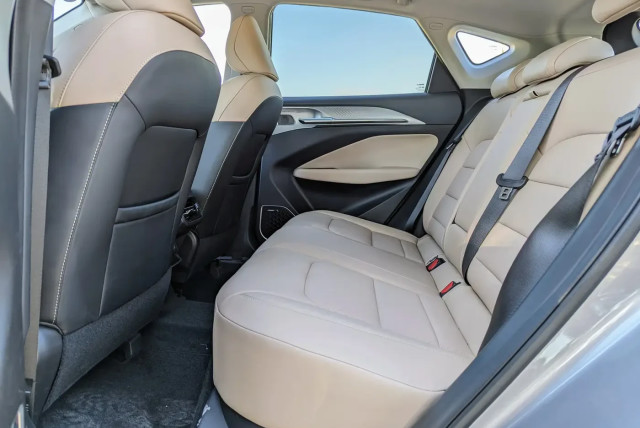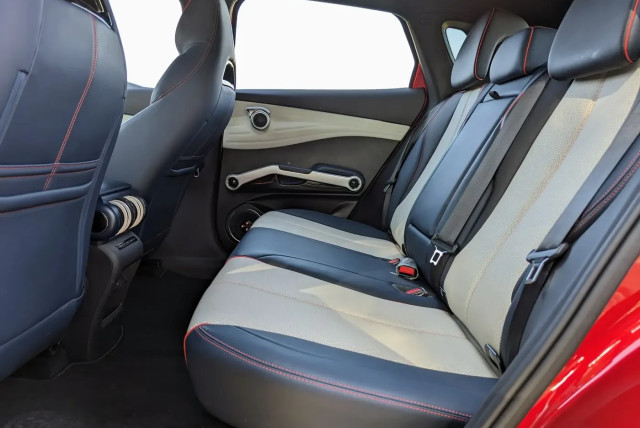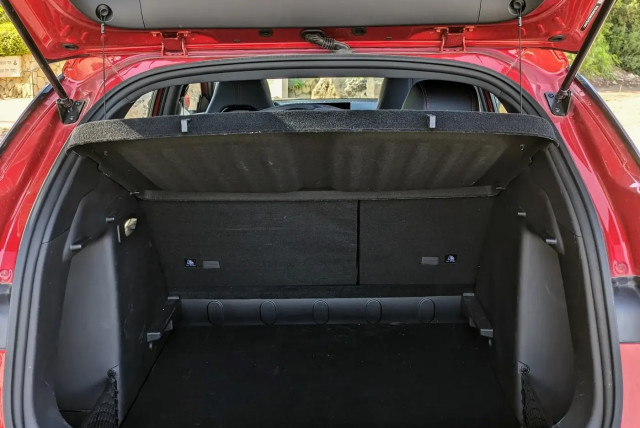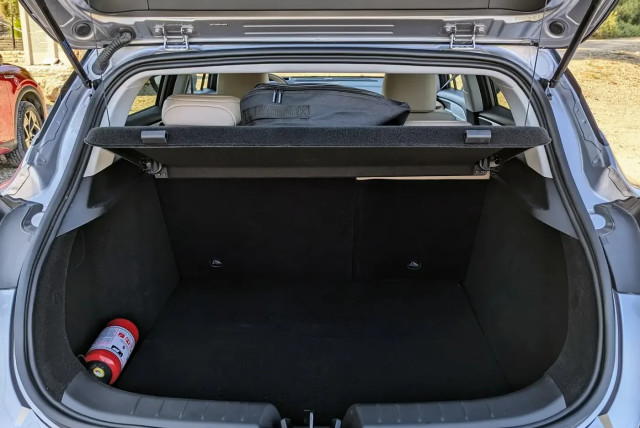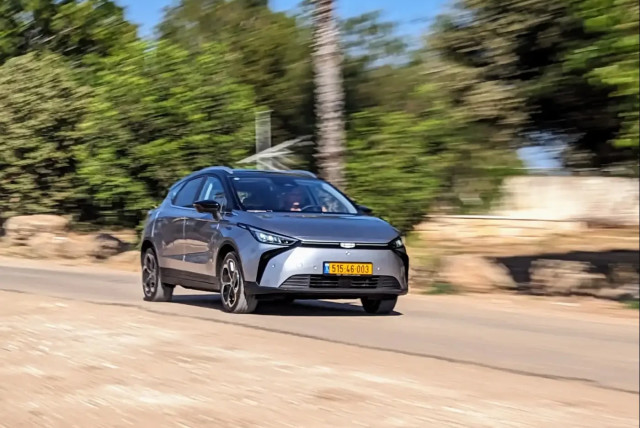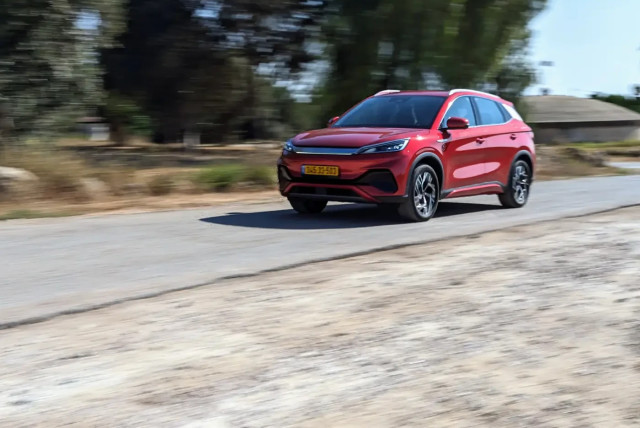The great tram battle: Geely geometry C vs. BYD Eto 3
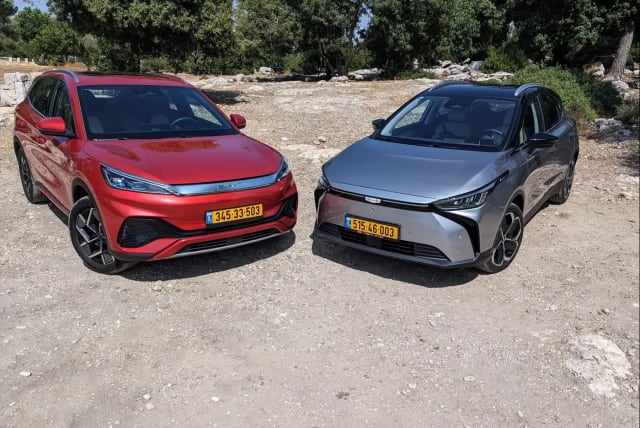
BYD Auto 3 is a best-selling vehicle in Israel this year. Geely Geometric C was top last year. First face-off since Geely facelift, representing the electric and Chinese car market revolutions.
Just two years ago, BYD and Geely were unknown names to car buyers in Israel. And here in the summary of vehicle sales in the first half of 2023, the BYD Eto 3 ranks first by a wide margin with 9,400 units and the Geely Geometry C ranks fifth, with 4,500 units. Both express two revolutions currently taking place in our car market: one out of every 6 new cars sold in Israel this year were electric, and one out of every 5 - made in China. The Israelis welcomed the unfamiliar Chinese electrical brands.
Is it the growing awareness of the climate crisis, or the feeling of "beating the system"? Along with zero emissions of pollutants from the exhaust - but considerable emissions from the power plants that produce most of the electricity in the country from coal and gas - the trams offer lower usage costs. Electricity is cheaper than gasoline and there is no tax on it, the costs of treatment are low, and the state gives them a significant benefit thanks to an annual license fee of only NIS 570, about a third of what you will pay for gasoline jeepneys in the dimensions and price of the BYD and Geely.
Geely was the best-selling electric vehicle in Israel in 2022, when it was the first to offer an electric crossover at the price of a hybrid Toyota Corolla. But the competition in the market is great and less than two years after its arrival in Israel, it receives its first facelift, with cosmetic updates and the passenger cabin, and minor improvements to the propulsion system and safety systems. Can the facelift bring her back to the top of the sales charts?
Design: The dimensions of the Geometric C and Hato 3 are similar, with the BYD being two cm longer, three cm taller and four cm wider, and looking more Jeep. While the Hato 3 is more Jeep, the Geely is More of a crossover, and closer in height to the family.The facelift gave the Geely a new front and tail.
In the upgraded passenger cabins, the Geely settled in brown and beige, the BYD in gray and white with a few touches of red. The coloring shows the thinking: the geometric still looks spacious and advanced, including a large multimedia screen as part of the facelift, the gear selector has moved from a dial on the central console to a handle next to the steering wheel, and the floating console has been partially eliminated, so that the cup holders and USB sockets are more accessible.
BYD is less conventional, which is felt in the design of the air vents that can be confusing, in the gear stick resembling the throttle of an airplane, and in the strings in the storage compartments in the doors, which will allow children to play on the parents' nerves. You can change the position of the huge multimedia screen to horizontal or landscape, more advanced voice operation, and more choppers. There are those who will like the abundance, there are those who will find it ornate.
As the dimensions suggest, the seating position in the Eto 3 is significantly higher than in the Geometric C, which makes it easier to both get in and out and take care of toddlers in the back and its front seats are more comfortable. The rear seat in the Geely enjoys slightly better knee room and is also deeper, although the BYD actually has 2 cm more in the wheelbase. But the headroom, the width and the flat floor give priority in this section to the BYD, which can better handle Transporting 3 toddlers in restraints, thanks to a seat width of 1.34 meters compared to 1.30 meters. Both have air conditioning ports in the back, but the Lato has 2 USB ports, one of each type, the Geely has only one, a mini. And on the hot test day the air conditioning in the Geely was effective more, and cool the cabin faster.
In the trunk, the Eto has an advantage in volume, 440 liters compared to 340 liters, but the Geometric has an important advantage in the form of a spare wheel. Equipment: Both are well pampered with the high equipment levels tested: light 18-inch rims, sun windows, leather-like upholstery, wireless charging for cell phones, electric driver's seats, huge screens for multimedia and operation (14.6 inches in the Geely after the facelift, 15.6 inches in -BYD in the equipped test version), and a modest 5-inch screen as a dashboard in front of the driver's eyes, LED headlights and peripheral parking cameras.
Geely has a successful upper display, BYD has an electric rear door. Only BYD has Apple CarPlay and Android Auto, a capability that has been added in recent weeks to cars already driving in Israel through over-the-air (OTA) updates, a capability that Geely does not have. The Geometry C doesn't yet have Apple CarPlay and Android Auto, but it does at least offer a waze app installed on its multimedia screen.
Both have apps that allow you to remotely monitor the state of the battery and charging, for example, but only in BYD you can remotely turn on the air conditioner before getting into the car, like in Tesla. Safety: Both models have a high level of safety equipment, including autonomous emergency braking, adaptive cruise control and lane departure correction. The facelift added rear cross traffic alert to Geely, but BYD also has emergency braking in reverse, and a score of 5 out of 5 stars in the European crash test. The Geely has not yet been tested in Europe, but received 5 stars in the corresponding Chinese test.
Performance: with the same power figures (204 hp), the performance of both is excellent, much better than gasoline or hybrid crossovers at the same price level, with a very slight advantage for Geely. Among the range, the Geely achieved a consumption test of 16 kWh per 100 km, compared to 17.5 kWh in BYD. But a larger battery, 70 compared to 60.5 kWh, gives the Geely a longer range, about 430 km in calm intercity cruising compared to about 345 km in the BYD.
The official range figure for the Geely was improved following The facelift from 460 to 480 km, one of the longest in its price group.
Both can be fast charged, with a faster rate in BYD - 90 kilowatts per hour compared to 70 in Geely.
While the Geely is a gasoline car that has been converted to electricity, the BYD was pre-engineered as such.
The BYD has a bit more grip than the Geely, which suffers from even more detached steering. Both are unimpressive in the road handling section, and will be inferior to equivalent gasoline Jeeps. The BYD presents superior ride comfort.
In the bottom line, Geely has an advantage mainly in the range and existence of the spare wheel, and also in the existence of reduced equipment and discounted versions, NIS 158,000 for the base version with the large battery compared to NIS 166,000 for the test vehicle, and NIS 145,000 for the base version with the small battery.
But the victory goes to BYD, thanks to better clearance, improved usability, generous equipment will be produced, good superior ride comfort and also concerns about the crash test. The Hato 3 falls short of the Geely mainly in range, a matter that is partially balanced by a faster charging capacity.
Although it is more expensive, with a price of 175.5 thousand shekels for the test car and 163.5 thousand shekels for the base version, without an electric door in the back, without the possibility to charge electrical appliances and other cars from the charging socket, and with a screen of only 12.8 inches, but it is a better and useful jeep more for the family.
On the technical side: Geely Geometric C Pro 480
Price (base/test car): NIS 158,000 / NIS 166,00
We liked: range, price, accessories, spare whee
We didn't like: rear seat width, comfort, trunk volume
Score: 8/10
Engine and drive: electric, front wheel drive
Power/torque: 204 hp, 31.6 kgm
Gearbox: automatic, direct transmission
Battery: 70 kWh
Dimensions:
Length (m): 4.43Width (m): 1.83Height (m): 1.58Wheelbase (m): 2.70Trunk: 340 liters
Performence:0-100 km/h (seconds): 7Maximum speed: 150 km/hCombined range (manufacturer): 485 kmCombined range (test): 430 km
safety:European crash test: not testedActive safety: autonomous emergency braking, adaptive cruise control, lane keeping, blind spot warning, rear collision warning, automatic high beam
responsibility:5 years or 150 thousand km for the vehicle, 8 years or 160 thousand km for the battery, extension to 10 years or 200 thousand km for NIS 2,500
On the technical side: BYD Auto 3 Design
Price (base/test vehicle): NIS 163.5 thousand / NIS 175.5 thousand
We liked: spaciousness, comfort, trunk Performance We didn't like: driving range, price Score: 8.5/10
Engine and drive: electric, front wheel drive Power/torque: 204 S, 31.6 kg
Gearbox: automatic, direct transmission
Battery: 60.5 kWh
Dimensions: Length (m): 4.45
Width (m): 1.87
Height (m): 1.61
Wheelbase (m): 2.72
Trunk: 440 liters
Performance: 0-100 km/h (seconds): 7.3 Top
speed: 160 km/h Combined range (manufacturer): 420 km Combined range (test): 345 km
Safety: Crash test European: 5 out of 5 stars
Active safety: autonomous emergency braking, adaptive cruise control, lane keeping,
blind spot warning, rear collision warning and autonomous braking, automatic high beam
Warranty: 4 years or 120,000 km per vehicle, 8 years or 150 thousand km for the propulsion system, 8 years or 200 thousand km for the battery
Jerusalem Post Store
`; document.getElementById("linkPremium").innerHTML = cont; var divWithLink = document.getElementById("premium-link"); if (divWithLink !== null && divWithLink !== 'undefined') { divWithLink.style.border = "solid 1px #cb0f3e"; divWithLink.style.textAlign = "center"; divWithLink.style.marginBottom = "15px"; divWithLink.style.marginTop = "15px"; divWithLink.style.width = "100%"; divWithLink.style.backgroundColor = "#122952"; divWithLink.style.color = "#ffffff"; divWithLink.style.lineHeight = "1.5"; } } (function (v, i) { });

